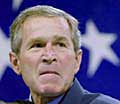
Climate experts from 16 of the world’s largest economies are in Hawaii for the second in the series of President Bush’s Major Economies Meetings.
They will be looking to forge common ground between “old” emitters like the US and Europe and the “new” polluters, such as China and India.
The meeting aims to feed ideas into the UN climate negotiations process.
The EU had threatened to boycott the talks unless the US offered specific proposals rather than general talks.
Since then, the US has passed its Energy Bill that mandates big increases in efficiency from cars and from some appliances.
But the US is still resisting a global agreement on specific emissions reductions from all developed nations.
EU delegates at the meeting in Honolulu do not anticipate any major moves by the Bush administration on climate change.
Some believe he is primarily trying to neutralise climate as an issue in the forthcoming US elections.
However, they are relieved that the US does appear actively engaged in climate talks at last.
A White House spokesman used a briefing to say that the US supported global moves to slow, stop and eventually reverse emissions.
But the official added that the burden must be shared between all the major polluters, including China and India. These nations are suspicious that the US is trying to shift blame on to them.
Clean technology
The first climate meeting that brought together the world’s biggest polluters was held in Washington in September 2007.
It ended with Mr Bush’s critics arguing that he professed world leadership on climate change while offering no new substantive policy and implicitly rejecting binding emissions controls.
In Honolulu, the UK Government is expected to welcome a decision by President Bush to channel $700m (











Social Profiles